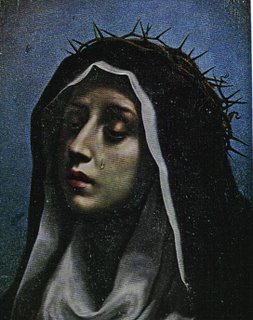
So that the more the holy martyrs loved Jesus, the less did they feel their torments and death; and the sight alone of the sufferings of a crucified God was sufficient to console them. But was our suffering Mother also consoled by love for her Son, and the sight of His torments? Ah, no; for this very Son who suffered was the whole cause of them, and the love she bore Him was her only and most cruel executioner; for Mary's whole martyrdom consisted in beholding and pitying her innocent and beloved Son, who suffered so much. Hence, the greater was her love for Him, the more bitter and inconsolable was her grief. " Great as the sea is thy destruction; who shall heal thee?" Ah, Queen of Heaven, love hath mitigated the sufferings of other martyrs, and healed their wounds; but who hath ever soothed thy bitter grief? Who hath ever healed the too cruel wounds of thy heart "Who shall heal thee," since that very Son who could give thee consolation was, by His sufferings, the only cause of thine, and the love which thou didst bear Him was the whole ingredient of thy martyrdom. So that, as other martyrs, as Diez remarks, are all represented with the instruments of their sufferings--a Saint Paul with a sword, a Saint Andrew with a cross, a Saint Lawrence with a gridiron--Mary is represented with her dead Son in her arms; for Jesus Himself, and He alone, was the instrument of her martyrdom, by reason of the love she bore Him. Richard of Saint Victor confirms in a few words all that I have now said: "In other martyrs, the greatness of their love soothed the pains of their martyrdom; but in the Blessed Virgin, the greater was her love, the greater were her sufferings, the more cruel was her martyrdom."
It is certain that the more we love a thing, the greater is the pain we feel in losing it. We are more afflicted at the loss of a brother than at that of a beast of burden; we are more grieved at the loss of a son than at that of a friend. Now, Cornelius a Lapide says, "that to understand the greatness of Mary's grief at the death of her Son, we must understand the greatness of the love she bore Him." But who can ever measure that love? Blessed Amadeus says that "in the heart of Mary were united two kinds of love for her Jesus--supernatural love, by which she loved Him as her God, and natural love, by which she loved Him as her Son." So that these two loves became one; but so immense a love, that William of Paris even says that the Blessed Virgin "loved Him as much as it was possible for a pure creature to love Him." Hence Richard of Saint Victor affirms that "as there was no love like her love, so there was no sorrow like her sorrow." And if the love of Mary towards her Son was immense, immense also must have been her grief in losing Him by death. "Where there is the greatest love," says Blessed Albert the Great, "there also is the greatest grief."
Let us now imagine to ourselves the Divine Mother standing--near her Son expiring on the cross, and justly applying to herself the words of Jeremias, thus addressing us: "0 all ye that pass by the way attend, and see if there be any sorrow like to my sorrow." 0 you who spend your lives upon earth, and pity me not, stop awhile to look at me, now that I behold this beloved Son dying before my eyes; and then see if, amongst all those who are afflicted and tormented, a sorrow is to be found like unto my sorrow. "No, 0 most suffering of all mothers," replies Saint Bonaventure, "no more bitter grief than thine can be found; for no son more dear than thine can be found." Ah, "there never was a more amiable son in the world than Jesus," says Richard of Saint Lawrence; "nor has there ever been a mother who more tenderly loved her son than Mary! But since there never has been in the world a love like unto Mary's love, how can any sorrow be found like unto Mary's sorrow?"
Extract from the book 'The Glories of Mary'
by St. Alphonsus Liguori
Peace of Christ to ALL

No comments:
Post a Comment